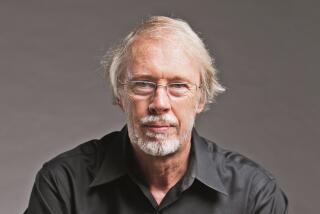Up from the Ashes
- Share via
Very few European Jews lucky enough to survive the Nazi concentration camps chose to live in Germany after the war. Among the exceptions was the father of novelist Jurek Becker, who settled his family in East Berlin. Born in Lodz two years before the war, young Becker spent his early childhood first in the ghetto, then in the concentration camps of Ravensbruck and Sachsenhausen. His survival itself seems a miracle. He grew up to become one of the leading lights of postwar German literature, starting in 1969 with his first novel, “Jakob the Liar,” which was also made into a film.
His novel “The Boxer” (published in Germany in 1976) is a remarkable book: the deceptively simple, low-keyed story of Aron Blank, a Holocaust survivor who quietly picks up the few remaining pieces of his shattered life and goes on living it as best he can. Aron’s story is told years later, by a man interviewing him about his past. Thus, the story of Aron’s postwar life is framed by the developing relationship between interviewer and interviewee, two men of different ages and backgrounds.
Aron is a kind of Everyman, an unexceptional individual who happens to have made a rather exceptional decision in choosing to remain in Germany. Becker portrays him not as a type or archetype, but as an ordinary man, scarred by his experiences, yet capable of compassion, reasonably intelligent but far from intellectual: “He did not think books superfluous, dispensable accessories; on the contrary, he thought of himself as pro-rather than anti-book. But one should beware [he felt] of overestimating their importance ... living more through books than through life.”
As a Holocaust survivor, Aron is eligible for some benefits, including, it seems, the right to move into an apartment previously occupied by a Nazi functionary: “[I]t was hard for him to get used to the fact that all these objects belonged to him.... There was a luxurious, king-sized bed ... with soft blankets. When he went to bed the first night, he sighed with pleasure--at last, a decent bed. But the anticipated pleasure proved to be fleeting.... Aron lay awake and found no protection from the past. His thoughts rummaged in it, in death and suffering, his two starving children lay beside him, his wife was repeatedly dragged from the room crying.... The nauseating smell that his bedmates in the concentration camp exhaled--to which he must also have contributed--would not leave him.... Hours later, he figured that the bed was too wide.” Taking a blanket, he wanders the apartment and finally lies down on the floor of the storage room.
The fact that the previous owner was a Nazi affects him strangely. Many of the furnishings distress him for reasons he doesn’t quite understand: a painting of a farmer with his horse and plow, for example: “It had been carefully painted and had pleasant colors. Yet now it disturbed Aron though he could not logically explain why. He could only convey, in passing, random concepts: return to nature, love of the land, the innocent word Arbeit.” The Nazi nightmare has poisoned the meanings of images, words and ideas that once seemed harmless or even appealing.
With the help of an organization called Rescue, Aron locates what seems to be his sole remaining child, Mark, who was transported to a camp at age 2. Although they can’t be certain that this Mark is the same child, Aron accepts him. It is many months before the little boy--fragile, starved and mentally backward--can be released from a medical facility.
Novelistically, the uncertainty surrounding Mark’s provenance functions not as a plot device (this is no mystery tale of mistaken identity), but as part of the pervasive sense of disjunction that shadows Aron and other survivors. After what he has experienced, nothing seems quite the same, yet he must make do.
In a diffident, almost unintentional way, Aron becomes involved, first with a Jewish woman from Rescue who has aided him in his search, then with a German gentile nurse who has cared for Mark at the rehabilitation facility.
In contrast to his tenuous relationships with these women is his devotion to his little boy. When the child comes home from school one day, savagely beaten, Aron arranges for him to take boxing lessons.
The plan works, providing Mark with the wherewithal to defend himself. Aron, too, in a metaphorical sense, has become a boxer: Although far from bellicose, he goes through life in a defensive mode: alert, self-protective, determined not to be victimized again. Yet as Mark grows up, father and son find it increasingly difficult to understand one another.
Aron’s conversations and interactions with other people, including with the interviewer, provide Becker with opportunities to touch on a variety of issues such as the treatment of former Nazis, the bombing of Hiroshima and immigration to Palestine. Tersely, yet vividly, Becker conveys how his characters feel, and why. In their unpretentious, plain-spoken exchanges, the large questions are epitomized and crystallized with admirable economy and expressiveness. Restrained, yet quietly intense, “The Boxer” has a veracity and scrupulousness that place it in a class of its own.
More to Read
Sign up for our Book Club newsletter
Get the latest news, events and more from the Los Angeles Times Book Club, and help us get L.A. reading and talking.
You may occasionally receive promotional content from the Los Angeles Times.










